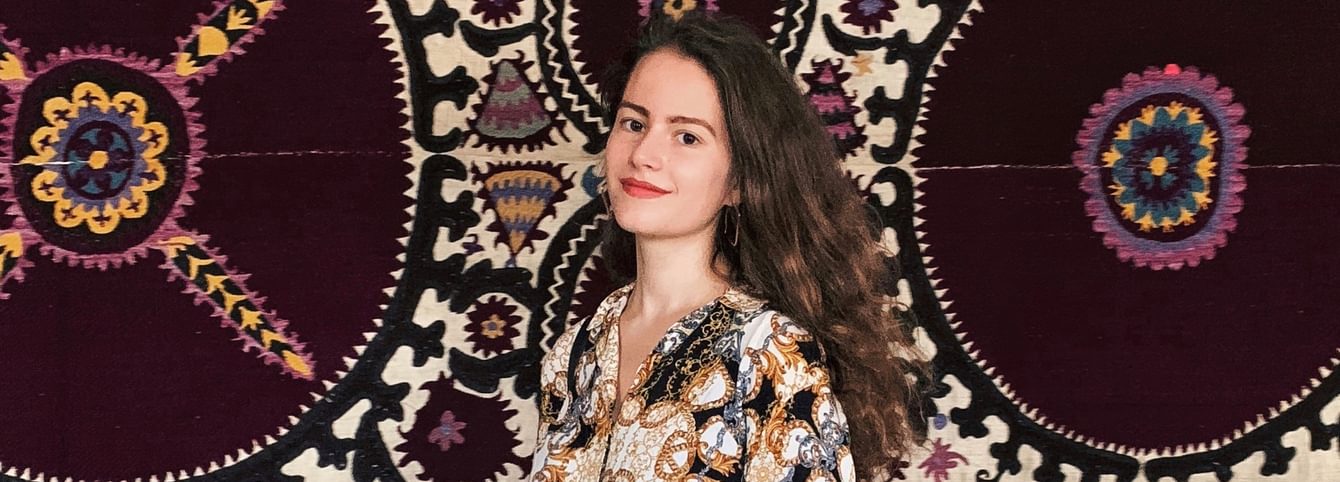Milena Djordjevic-Kisacanin
Milena Djordjevic-Kisacanin is an alumna of the 2019 CLS Persian program in Dushanbe, Tajikistan. She’s currently an undergraduate student at the University of Texas at Austin, studying Middle Eastern Studies, Middle Eastern Languages and Cultures, and Eastern European Studies. Milena plans to pursue graduate studies that will allow her to use her Persian while researching nationalism and peace and conflict studies.
A Love of Exploration
I was raised in Plano, Texas, which I’ve always thought of as a bit of a boring suburb, so I love nothing more than to venture abroad and experience new cultures and countries! Other than classes, at my university I like to try and foster an intellectual community and popularize the often-obscure nature of academia. For example, one of my favorite extracurriculars is hosting my department’s podcast, The Slavic Connexion, in which we bring professors and guest lecturers onto our show and talk to them about their research or exciting developments in their fields.
Why Persian?
Persian a gorgeous language in which so much famous poetry and literature has been written. Since high school, I’ve been in love with the poetry, cities, and architecture of the Persian world. I decided to take Persian because I wanted to read poets like Hafez and Rumi in the original language.
Persian is also very important to current events and modern security. Not all of Persian is Iranian Farsi – learning Farsi can also be a gateway to learning Dari or Tajiki, languages of two other fascinating countries. I’ve used my Persian knowledge to talk to and work with Afghan refugees, which has proven very rewarding.
Career Goals
I plan to pursue a PhD before becoming a professor specializing in the study of nationalism and ethnic/sectarian conflict in the Balkans, Middle East, and Central Asia. In my research on ethno-nationalism and peace and conflict studies, I would like to do a comparative perspective between the Balkans and Central Asia. Both of those regions were under a socialist or communist regime for most of the 20th century and experienced some forms of civil war and violence after the collapse of communism. My knowledge of Persian would greatly benefit me in this comparative research!
A Memorable Vocabulary Lesson
My host mother was half-Russian and half-Tajiki, and although her Tajiki was excellent, sometimes she didn’t know the Persian word for certain things. One day I pointed to a bug flying around our yard and asked her how to say bug in Persian, or, as I explained it, what the general word for animals like flies, mosquitoes, and spiders was. She thought for a moment and said, “All of those animals fly (miparand). Therefore, the word is ‘parande.’” Little did I know that parande, although it literally meant “flier,” was the word used to mean “bird!” The next day I tried to alert my Persian class that there was a wasp in our room by calling it a dangerous parande – and everyone looked up confusedly, trying to find the bird that had invaded our room without anyone noticing! That day I learned the actual word for bug was ashghalat.
Appreciating Immersion
CLS is an incredible experience! It’s rare to be a part of such an immersive environment in language study, and I’d recommend anyone to apply who is considering it. I enjoyed living with my host family, feeling that the cultural immersion was one of the most valuable aspects of the CLS Program. One of the most fascinating things I observed was that people in Tajikistan are still nostalgic for the USSR. It seems that what they were nostalgic for was a sense of state security, order, and prosperity rather than for a particular political ideology (Tajikistan fell into civil war after the Soviet breakup – this continues to be a traumatic memory). This has changed the way I understand modern politics and nostalgia, and has changed how I perceive current events in my community.



